Toronto Maple Leafs General Manager Kyle Dubas addressed the media at the halfway point of the season, discussing the team’s first half of the season, its trade deadline intentions, the level of concern about Frederik Andersen’s play, and much more.
Opening Statement
Just after the midway point of our season, I wanted to give a brief update of where we are at and allow the media to ask any questions they have about our season to date and where we are headed in the second half.
From my end of it, the standings as they currently are are probably a very fair indication of our overall quality in the first half of the season. Early on in the season in January, we probably weren’t in the form that we aspired to be. We were fortunate in terms of the goaltending that we received and some of the bounces that went our way.
In February through the first part of March, we really started to show the team we aspire to become over time. It was a bit of a setback in the two games over the weekend, but it is a good chance to reset now. I think this is a key opportunity for us to continue to show growth in how we find our form here coming off of last weekend with Calgary coming in playing very well on Friday and Saturday.
We are also under four weeks away from the trade deadline. I think it is very clear that our team will explore every opportunity we can to approach as we head towards the trade deadline.
That is the update from my end. I will turn it over for questions you may have at this time.
Kyle Dubas on the trade deadline: Willing to part with a top prospect, talks concentrating on forward help so far, comfortable with rentals
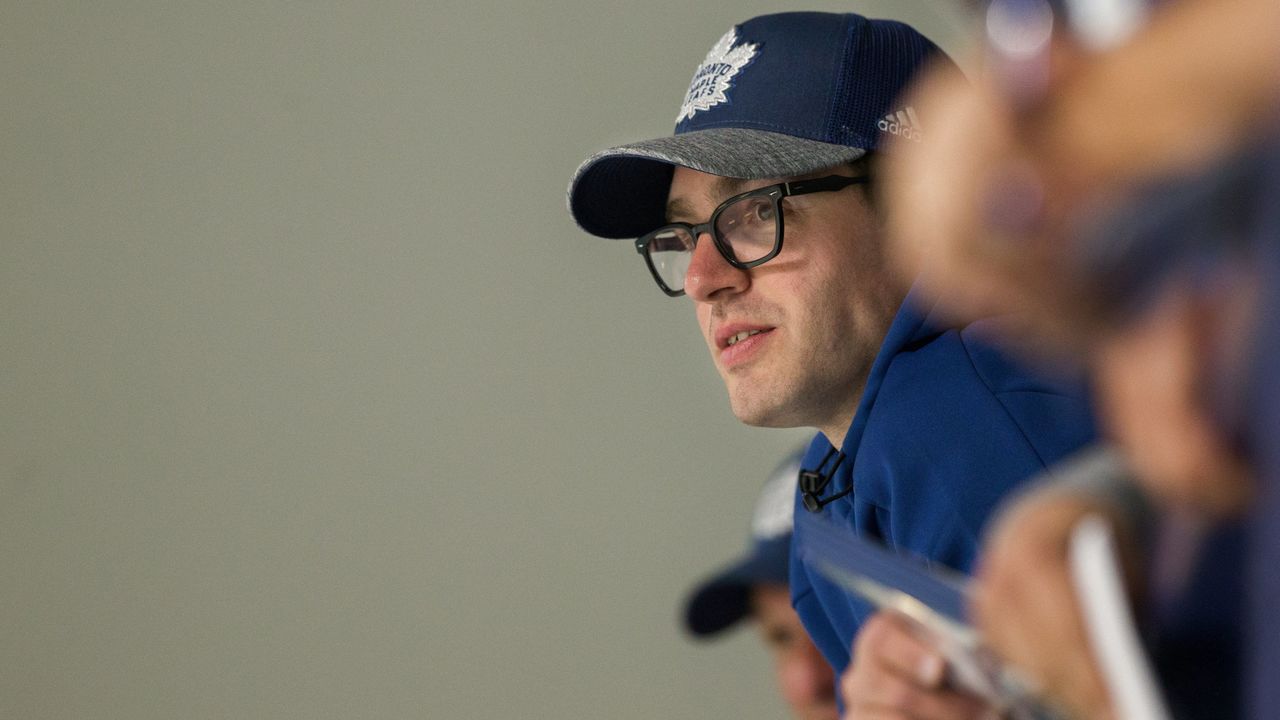
If you are able to add to the group, what is your greatest area of need?
Dubas: We will look at everything. I don’t go in transfixed on any one area in particular. If we can, we will try to improve at any position that is possible. Some areas on our team, like defense and goaltending, are a little more stable. In the summer, we had to move out some forwards that were good forwards for us in order to add on the backend. Thus, we feel like that is an area we may want to look at a little bit more. But I am not precluding anything at this point. Most of the conversations are concentrated on forwards right now.
Would you consider trading a top prospect this year to improve your team?
Dubas: Yes.
Is a rental player an option for you guys given the cap implications past this year, or could a hockey deal work if it is ultimately the right fit?
Dubas: I think we would look at everything. Certainly, knowing the cap is going to stay the same, anything that is added that has an obligation… Usually, you would put a premium on players that have future years. With Muzzin and Campbell, that is what we have done. It is a little bit more complex this year knowing that, very likely, the cap is going to be at $81.5 million again. Anything that we take from next year’s allotment impacts a number of different things as you can well imagine.
It is a rare time where probably a rental is a better fit. That said, if it is something that we feel can improve the team long term, we will find a way to make it work and figure it out, whether it is a pure hockey trade or having to do something else to offset it.
You’ve made big trades in junior. This season is so different with an all-Canadian division with no Tampa or Boston. How do you know when to go for it, and how do you balance all of it with future prospects?
Dubas: I think the team tells you that in how they respond. This will be a great stretch. The team will show how they respond when things aren’t going perfectly. It is great when you wake up every day, you’re winning, and it’s fun and easy. When you start to stumble a little bit and maybe don’t get the results you want as consistently as you have, I think it is a great opportunity for growth.
As I mentioned in the opening, the great teams are the ones that have great seasons and go on great runs. They all deal with these types of stretches, and they deal with them very, very well. They use them to fuel better performance and better results as it goes on. That is what I am looking for now.
If our group can do that, in combination with what they showed at the beginning of the year, the onus will be on me to do everything within reason to improve the group.
How much room and flexibility do you think you will have under the cap to add salary between now and April 12?
Dubas: Certainly, the cap situation — not only for us but for two-thirds of the teams in the league — is very tight. I am very, very fortunate here to have Brandon Pridham on the staff. He and I talk for hours every day about different things we can do and will do and are attempting to accomplish as we go through it. I think we are going to have to be creative and we are going to have to find ways — anyway we can — to improve the team now and in the future knowing that the salary cap is going to be stagnant.
That’s not only now in the season but also in future years here. That is where Brandon’s value is even more immense than usual — times like this — because he not only has a great understanding of our situation but of other situations. He can come up with different ideas and we can bounce things off of one another before we go to other clubs in the marketplace and try to find a way to improve the team with limited cap space.
Was placing Jimmy Vesey on waivers today a cap-related move or is there something else at play there?
Dubas: A couple of things — with what happened at the beginning of the year where we have placed a number of guys who now comprise our fourth line on waivers or sent them down, I thought it was really good competition. Whether it was Adam Brooks or Petan or Travis Boyd or Joey Anderson — Vesey, Spezza — all of the different players who have played in those roles were coming in and out of the lineup. I thought that competition really fueled great performance from those players.
When Campbell came off of LTIR and back onto the roster but now has been sort of day-to-day here since the game in Edmonton, it has sort of limited what we can do in terms of players coming on and off, especially because we don’t have much waiver flexibility with those guys on the lower end of the roster. They have gone past that 10-game threshold long ago.
One of the things we are looking to do is increase our flexibility on roster, but also as Campbell and Simmonds get closer to a return, we do have to do some juggling with the cap situation.
Will the circumstances this season lead you to be more aggressive than you would be in a normal season?
Dubas: Going back on the two deadlines now, we have tried to act as early as possible. With the Muzzin trade and then Campbell and Clifford last year, those were about the same day off of the top of my head — sort of early February, three or four weeks ahead of the deadline. Right now, we sit just under four weeks away from the deadline.
Given the quarantine that is in place right now — the player is going to come in and sit for 14 days in their hotel and then join the club — we are going to be in a tougher spot to get as much out of it as we can. If you look at the schedule and where it goes, April 12th is the deadline, and in the two weeks beyond that, you are at April 27th or 28th before they get out of their hotel. They are only with the team for six games or 10 days.
It certainly provides an incentive to try to make the moves earlier. It takes two to make that happen, though. We will see. Certainly, for us, the sooner we can get a player in here through the quarantine and integrate them into our program systems-wise, the better for them and for us.
The inventiveness last season where the Leafs acted as a middle man to retain salary in the Robin Lehner deal, is that a tactic you may use?
Dubas: The hindrance on that is that I don’t know many teams that have the cap space to serve in that role. But we would explore everything we possibly could if it meant improving the team.
Are you still operating under the assumption the quarantine will remain 14 days?
Dubas: That is a decision that is far above my level. That is a government and NHL discussion. I know that in the bubble in the summer and again in training camp, there was the modified quarantine because of the level of testing that our players and people are doing, which is daily. They did allow it. Once you are tested for seven days, you are able to go between home and the rink. That was in the summer and then again in January, but that has elapsed now.
That was something that was worked out between the NHL and the government of Canada. We will continue to abide by the current rules until they tell us they are different. I am hopeful — not just for hockey but for everybody — that we can see some light at the end of the tunnel here, begin to work our way through it, and return to a little bit of normal life as we head towards the summer.
You have managed to make a couple of trades already in the season. Can you give a plan for what you think is going to happen with Alex Galchenyuk and whether he has a chance to make your roster this year? Can you also go through the logic of the Lehtonen trade and what Veini Vehvilainen offers you in net as a depth goalie?
Dubas: With Alex, it was convenient because he was still in Ottawa. We didn’t have to deal with the 14-day quarantine that every person coming into Canada has to deal with right now. As it pertains to roster space and so on, it was really convenient that we could have him drive from Ottawa, test a couple of times, and be a part of our group.
In discussions with Alex and his agent Pat Brisson, it was clear that we needed to get him into a situation where we could reset Alex and start to build him back up. He was obviously a player that a great stretch in his early 20s. He has now bounced around a few times. What we wanted to do was stabilize him and get him working with our development staff and rolling in games with the Marlies.
It was just really fortunate how it all worked out. The Marlies, at the time, had a lot of games coming up and they were all in Canada. We just thought it was a chance to add to our forward depth, work with Alex, and allow our development staff — and Greg Moore with the Marlies — to attempt to get him on track.
I watched all of the games, but more importantly, the reports from Greg and the Marlies staff and the development staff here are that he has been outstanding in terms of his work ethic, commitment, and attitude. Watching the games, he has obviously played quite well. We just want to have him continue to build up his confidence and improve his form. Certainly, I think, in time, he will get an opportunity.
On the trade last week of Lehtonen to Columbus for Veini Vehvilainen, it is a situation where Mikko had come over here clearly with the intention of playing in the NHL. He had gotten into nine or 10 of our first 26 or 27 games. We wanted to do right by him a little bit and give him a chance.
We had felt our defense was playing well. We also have other D — Sandin coming back healthy, Liljegren has played extremely well for the Marlies, plus Rosen and Marincin and Hollowell and others who have played well. Rather than be just committed to one person to get the opportunities when guys can’t go or if we change our third par — as Sheldon has done sometimes this year — it was probably best to work with Mikko and his group and find a solution for him so that he can accomplish his dream that he set out to do when he came over here from Jokerit.
Our goal was to try to return to a goaltender. It has been a situation this year where Joe Woll’s development — in order to abide by the NHL’s rules on available goaltenders — has kind of been squeezed a little bit. He has only been able to play one game because we have had to bring him with us to serve as our number three, especially with Campbell being in and out of the lineup. And Fred was injured as well.
We felt that getting a depth goaltender was important. Our staff, particularly our R&D staff, have been big fans of Veini for a long time. He has been an excellent goaltender in Finland and in international play before the start of his career in Cleveland last year. We are excited to have him. He is in quarantine on day three of 14. He will get out and rolling, and we will incorporate him into the program.
Kyle Dubas on Frederik Andersen’s play: “Fred, over time, has continually shown us that he is able to find his way out of it”
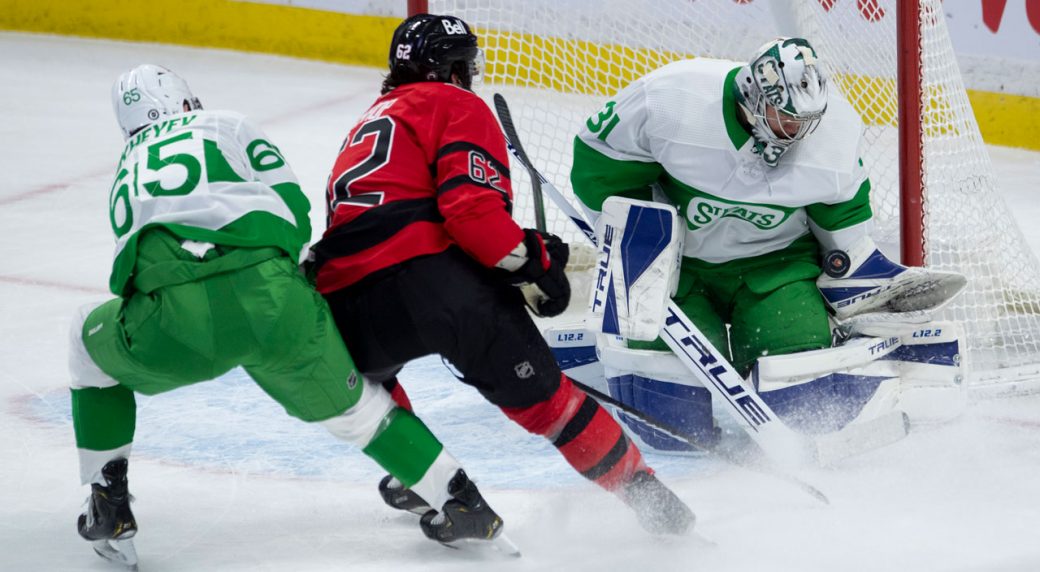
What is your overall assessment of Frederik Andersen’s play through 30 games?
Dubas: With Fred, this is his fifth year with the team now. I know, in going through this before with Steve, it is a major topic. If Fred has shown us anything in the four and a half seasons that he has been with us, it is that he has a tremendous ability to gather himself when he may not be playing to the standard he sets for himself.
He has been very open about that. If you go back through each of the seasons, any time Fred has found himself in a bit of a rut per se, he is able to pull himself out of it. That is the expectation of what we will see from him as we move ahead.
The rut kind of goes back to last season. Do you see it that way or not? Is this a little bit lengthier than maybe you would hope for at this point?
Dubas: Going back to last season, I don’t think early on in the year… We had a stretch in the year where we were really poor defensively. Regardless of who was in net for us, it was a tough place to play in net.
In the second part of the season — if you go back to around the same time last year, and maybe I have it off because the calendar is tough to follow for the last 12 months or so — we were in that late-February part of the calendar, and Fred had not been playing well. On the California trip, I thought he had an exceptional trip. Coming back against Tampa, he pulled himself out of it and started to string together some excellent performances.
I have a lot of faith that Fred, over time, has continually shown us that he is able to find his way out of it and that he will [now].
Do you feel content with what you have in the goaltending position?
Dubas: When healthy and when everyone is up and rolling, I think it is a great tandem. Hutchinson has come in and given us good minutes. Sunday night was not a great night for anybody on the team, but we have been happy. We were happy with how Joe Woll played on Friday for the Marlies. We are looking forward to him getting into more games.
I have a lot of belief in Fred, Jack Campbell, and Hutch when he is in. We will look to continue to get everybody healthy and rolling and roll from there.
Kyle Dubas on the first half of the season & goals for the second half
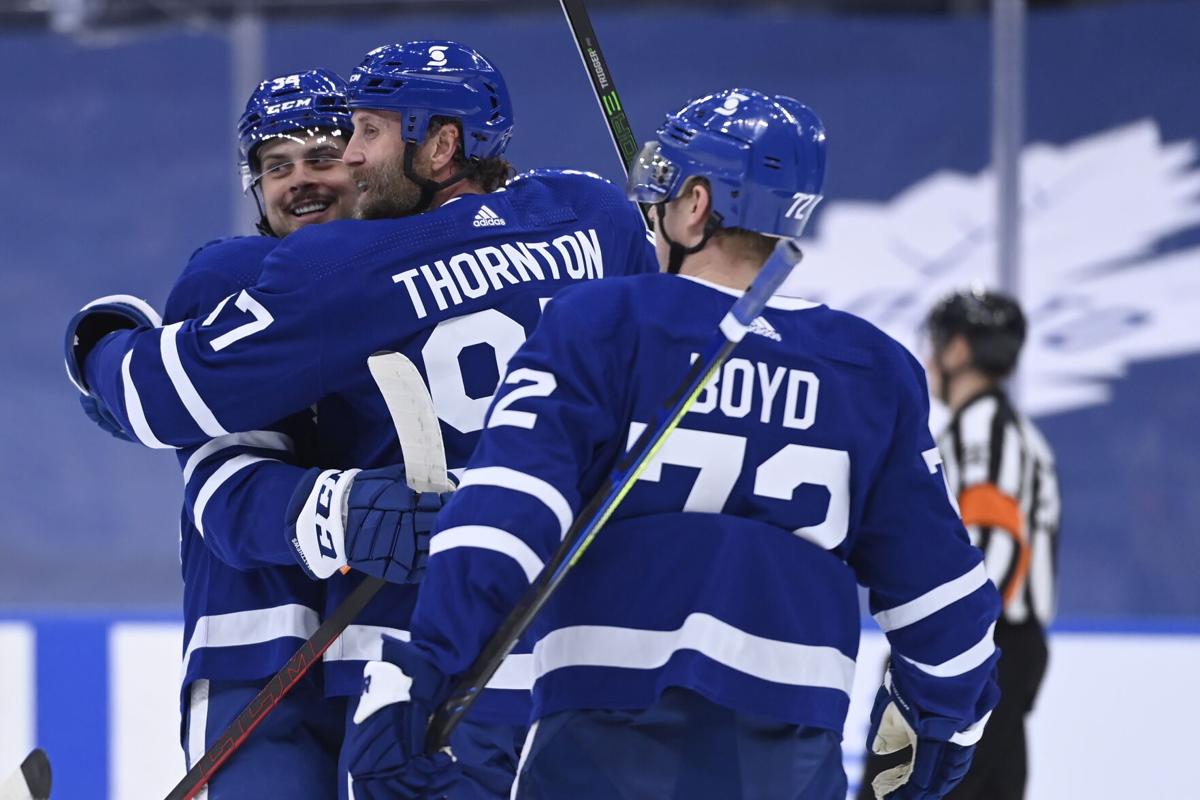
Your approach to roster construction came under a lot of scrutiny over the offseason. Apart from late February and early March, do you feel vindicated by how the team has shown it can perform?
Dubas: I wouldn’t say vindicated. Regardless of what is being said about the team or me outside of the group, I put a lot of pressure on myself to continue to — with Shanny, Sheldon, Brandon, Laurence, and our group here — build and get better. I don’t think it is anywhere close to where it can be in time.
That is sort of the part that drives us and drives me: We have had really good stretches this year, and there have been times that I think I haven’t done a good enough job whatsoever in helping the team. Whether that is what drives me or pushes me and the group to get better, then that is fine.
I am certainly not vindicated by good stretches in the regular season. An entire regular season of great results and the results that we expect would be one thing. That fueling playoff success would be another. The goal for the group is high performance sustained year after year. Only after that time, years on, would I ever feel any sort of vindication. I’ll still be trying to drive to continue that as long as we can.
I certainly feel that any criticisms are warranted until we reach that point. I don’t take those personally at all.
Where do you see the biggest area of opportunity for growth in the second half of the season?
Dubas: We have a great opportunity right now. We showed, even in that stretch in Vancouver and the first half of that Winnipeg series, that we were playing well. They got some great goaltending from Demko in Vancouver. Hellebuyck, as we all know — those are high-end goaltenders and they played very well. Coming off of that Edmonton series, maybe we did let our foot off the gas a little bit after having swept them.
It goes back to the original availability we had at the beginning of the year — there is a real focus on staying consistent throughout the regular season. I would be more alarmed if we had played really poorly in Vancouver and the first half of the Winnipeg series. I thought we did play well.
It is our ability to stick with that and continue to grow as a group, as we did through February and the early part of March, that is a great opportunity for growth. If you go back — I do this a lot, trying to study other teams and where they are at in their seasons and how they have gone through them — to last season and look at the teams that were in the final four, whether it is Tampa, the Islanders, Dallas, Vegas, they all had really bad stretches of their season as well, whether it was winning three in 11 or 12 games or losing seven or eight in a row.
Great teams find a way to stop the bleeding and pull themselves out and use those as opportunities to grow and get better. That is what I am looking for now from our group.
The sweep over Edmonton — in your time around the team, has there been a better three games in a row? Can that act as an example of what the team can do when the team buys in?
Dubas: I certainly think there is something to what you are saying — big time. Going into that series, Edmonton was four or six points behind us. They had come off of their rough stretch of the season, and I think they had won 11 of 13 heading into that against us.
It kind of feels like in baseball where you get into July-August, and you have the first and second-place teams going into a series and big swings can happen. I thought it showed what we were capable of — offensively, defensively, and in net. It certainly serves as an example of what we can be.
Now the key is doing that as often as possible, and not just when you are concerned about an elite offensive team with two of the best players in the game — not just in those situations, but against every team we play. I think it does serve as a great example of what we can be when we are at our best. Now it is a matter of doing it as often as possible.
You and Sheldon had talked about focusing on team defense and keeping guys to the outside. In general, through the first half of the season, can you talk about how guys have bought in and the improvements that you have made in that respect?
Dubas: In terms of where we are at in general, certainly the quality of chances we are giving up and the number of goals — notwithstanding that we are coming off of back-to-back games where we gave up more than we wanted to in terms of goals and chances — we have been generally happy with the improvements that we have made in that realm. Especially the commitment we have seen from our absolute best offensive players to the defensive side and them sort of leading the way.
The way we have always looked at it: If those players can excel in all three zones of the rink, it forces everybody else on your team to do the same. We have been very happy with that. I think we still have a lot of room where we can get better in it, though, and that is what we will be looking for in the second half.
You brought in veterans last offseason with Simmonds, Thornton, Bogosian. How have they helped so far?
Dubas: I don’t know if you can hear Joe in the hallway, but he doesn’t take many days off. His attitude and disposition don’t change day-to-day. He has seen it all in his time in the league. They have brought a lot of spirit to the group. All of the players acquired in the offseason have really improved the spirit of the team.
Unlike in previous seasons where you go through a stretch where it is not going well and you feel the group start to sag, I haven’t felt that right now. Guys like Joe, and with Wayne getting closer to his return whether it is this week or next week, add a lot to the group.
We talked about it at the end of last season and the season-opening availability: That has sort of been an area that has been a focus for us, whether it has been adding Muzzin and Clifford and Campbell, or in this offseason again with Brodie, Thornton, Simmonds, and Bogosian. I do think that is a real important part of helping the team, team chemistry, and the culture and environment of the group.
Those guys don’t change day to day. They have added a lot to us so far.
Zach Hyman has had quite a versatile season for you guys. Have there been any talks about his immediate or long-term future with the club? How much has the expansion draft played any sort of role in trying to figure out this season for acquiring guys and beyond this season as well?
Dubas: Zach, in terms of his versatility, I don’t disagree too much. One thing I would say is that his versatility has been something he has brought since he got here every single day. His work ethic, leadership, and character have never been a question for us.
He can go up and down the lineup and be as effective on that line — like he was in Edmonton — with Mikheyev and Engvall as he is with Auston and Mitch. It doesn’t impact Zach day to day regardless of who he is playing with or where he is in the lineup, or whether he is on the power play or not. He comes and works and is an outstanding leader and person for us.
With regards to his future, I am not going to comment on any of he or the pending free agents — restricted or unrestricted — I just don’t think it is productive at this time to do so.
With regards to the expansion draft, every team in the league knows that we face it. We have tried to prepare ourselves as most as possible for the expansion draft. Brandon Pridham and I will go through it consistently and try to get a read from Seattle as to who they might be keying in on, and how we can mitigate the damage that is done by that.
We are happy to welcome them into the league, and losing a player from your group is part of that business. We will sort our way through it and get through it, as we do with everything else. We look forward to having Seattle in the league next year.
Now that you have a little more data, can you talk about adding depth from the Marlies in the second half? Where might Galchenyuk, Sandin, Robertson, Liljegren fit in?
Dubas: With those depth-type players, we will have more players coming over from Europe when their season ends — for example, Semyon Der-Arguchintsev is in day four or five of quarantine after his season with Torpedo ended. He had a really good season for them playing as their season-line center in the KHL at 20.
We are happy with him and we will have others, whether it is Hallander or Malgin, come over when their season is done. As we get deeper into the year, the competition will increase. We have had strong performances from individuals on the Marlies as well, whether it is Galchenyuk or Barabanov. Barabanov has had a great couple of games, which was the intention of getting him down there and playing in big minutes.
We feel good about the depth and where our prospect pool is at right now in terms of being able to challenge guys on the roster and push guys on the roster. We are happy with that.
Especially as the Marlies have gotten playing, we feel good about where it is at and the improvements those players have shown under Greg’s leadership with them.
There have been a couple of fights in the North Division that have led to injuries of late. What is your general feel on the role fighting has in today’s game?
Dubas: You never want to see anybody hurt regardless of how it happens. With there being so much familiarity between the clubs, you are going to have more and more instances where tempers flare, whether it is between teams or between teams and officials. Everybody is seeing each other so often. I think that is leading to an increased focus on physicality and the temperament part of it, with it flaring a little bit and getting off the rails. That is where it goes.
We have had this discussion here a lot over the years about what toughness truly is and represents. I don’t think it necessarily has to do with just fighting. I think it is how you play, how hard you play, how you compete for loose pucks and space. That is how we focus on it — not so much on the fighting part.
How difficult is it going to be to know whether you can hang with the Tampas and Bostons if you haven’t played them this year?
Dubas: It is a great question. In terms of competition and where your team is at, looking at it as, “If we can get into the final four,” is probably not the way we will do it. We will be focused on our division. Those are the only people we are competing against.
When it comes to staying in tune with what is going on around the league, I personally felt that early in the year, you get so transfixed on your division and the race night in and night out. In wanting to make sure I was keeping a good pulse on the league, our R&D department actually sent me a schedule of how to watch every week so that I would see every team enough and stay in tune with the other teams enough. We are fortunate to have them.
I would certainly agree there is a pull to watch your division much more because of the way it impacts the standings.
In terms of the question of who we can hang with and who we can’t, I think every team in the North — and the teams in the other divisions — will say that they will worry about that when they get there if they do get through their own division to the final four. That is the way every team will handle it.
Kyle Dubas on the Amazon All-or-Nothing series, challenges of prospect development amid Covid-19
Why did you decide to welcome Amazon’s cameras into the group and be part of the All-or-Nothing series? It is a ground-breaking thing for an NHL team.
Dubas: The league had come to us last year. In particular, I had watched all of the seasons for the English Premier League teams. There was Manchester City, which I watched with a special interest for sure. That was my first introduction to the series. I have friends who worked with the Philadelphia Eagles as they went through it. I had a bit of an idea.
Steve Mayer from the NHL approached us last year about it. We declined to do it. He came back again after the summer about wanting to do it, and I think the way that we viewed it is that it is us being a good partner in the league to get Amazon involved.
Individually, as a team, for the media and fans, it is a good opportunity for the fans to see the way that things actually operate behind the scenes here day to day, with a good look into what we are really, truly about — more than just the three hours you see us at game time.
It just gives us a chance to show what we are about and be a good partner to the league and to the other teams by doing this.
With the title of the series being, “All or Nothing,” is the expectation of Stanley Cup or bust realistic for a team that hasn’t won a playoff round?
Dubas: I don’t know that the title of the series is the be all, end all of where we are at as a team. As I said before the season, we are looking to be a team that performs at a high level year in and year out. That starts in the regular season with being a top regular-season club and letting our regular season build our habits going into the playoffs. We feel that if we do that consistently — year in and year out — it will lead us to our ultimate goal, which is to win.
It is so hard to look at it in any sport and say, “It is X or bust.” There is a lot of talk about winning a playoff round or bust, or winning the Stanley Cup or bust. I think those can be very day-to-day endeavours. Especially in this role, it has to be more long term. You can’t get caught up in how the short-run results impact that. It is about trying to build a program for a team that has a high level of performance every single year.
That is really the goal from my end. I know that people from the outside — media and others — have something in mind for what they expect from the group. That is part of doing the job here. I completely understand it and accept it. For me, the focus has to be on the long run and building a program that can reach our objective.
It has been a strange year for prospect development. Is there something you have done this season that has really benefited the prospects?
Dubas: That is a good question. I would say that we are most thankful in this regard to the various teams that have had our prospects on them in Europe. They have been outstanding to deal with in terms of access and video and giving us feedback.
You can go all the way through the list. Whether it has been Ufa or Ässät or Jokerit or Luleå, they have been outstanding to deal with when they really don’t have to be. They’re focused on their own season and they really don’t need an NHL team that doesn’t start for another three or four months [bugging them], where you’ve got this extra focus on your prospects that are playing. I think a lot of the credit has to go to them.
In the offseason, I think the development staff that was here — Darryl Belfry, Barb Underhill, Randi Malini, Nik Antropov, Denver Manderson — were sort of in the building every day. There was really nothing to do and we had to operate within certain rules and restrictions, but they were able to do some really great one-on-one work. Scott Pellerin and Stephane Robidas were able to really take over the relationships with the teams that our players were developing with.
We have Will Sibley with our staff and he has been outstanding at connecting it all together. It has given us a chance to be able to adapt and not be too complacent in what we do with development. I don’t want to get too deep into the way that we do it or run it, but I have been really happy with the job that the staff that was here in the summer and Will Sibley have done in that regard.


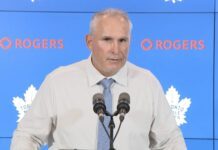

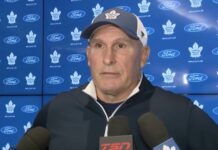
![Craig Berube on Nick Robertson joining William Nylander’s line: “If he gets to a good area on the ice, [Nylander] can find him… He has to put a couple in and get some confidence” Craig Berube, Toronto Maple Leafs head coach](https://mapleleafshotstove.com/wp-content/uploads/2024/10/berube-leafs-prac-218x150.jpg)

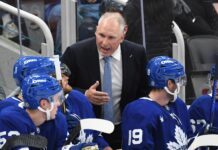

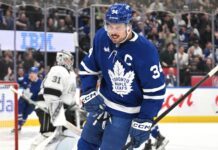
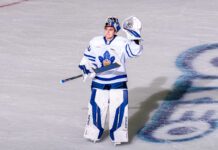
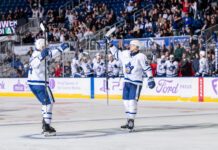
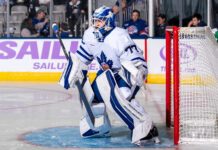
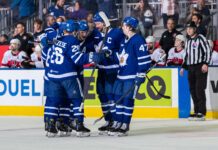
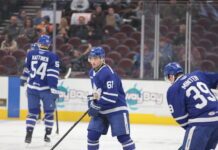

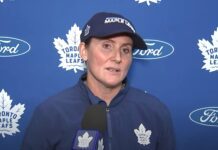
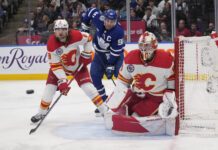


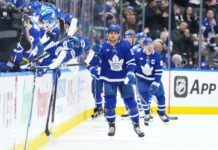


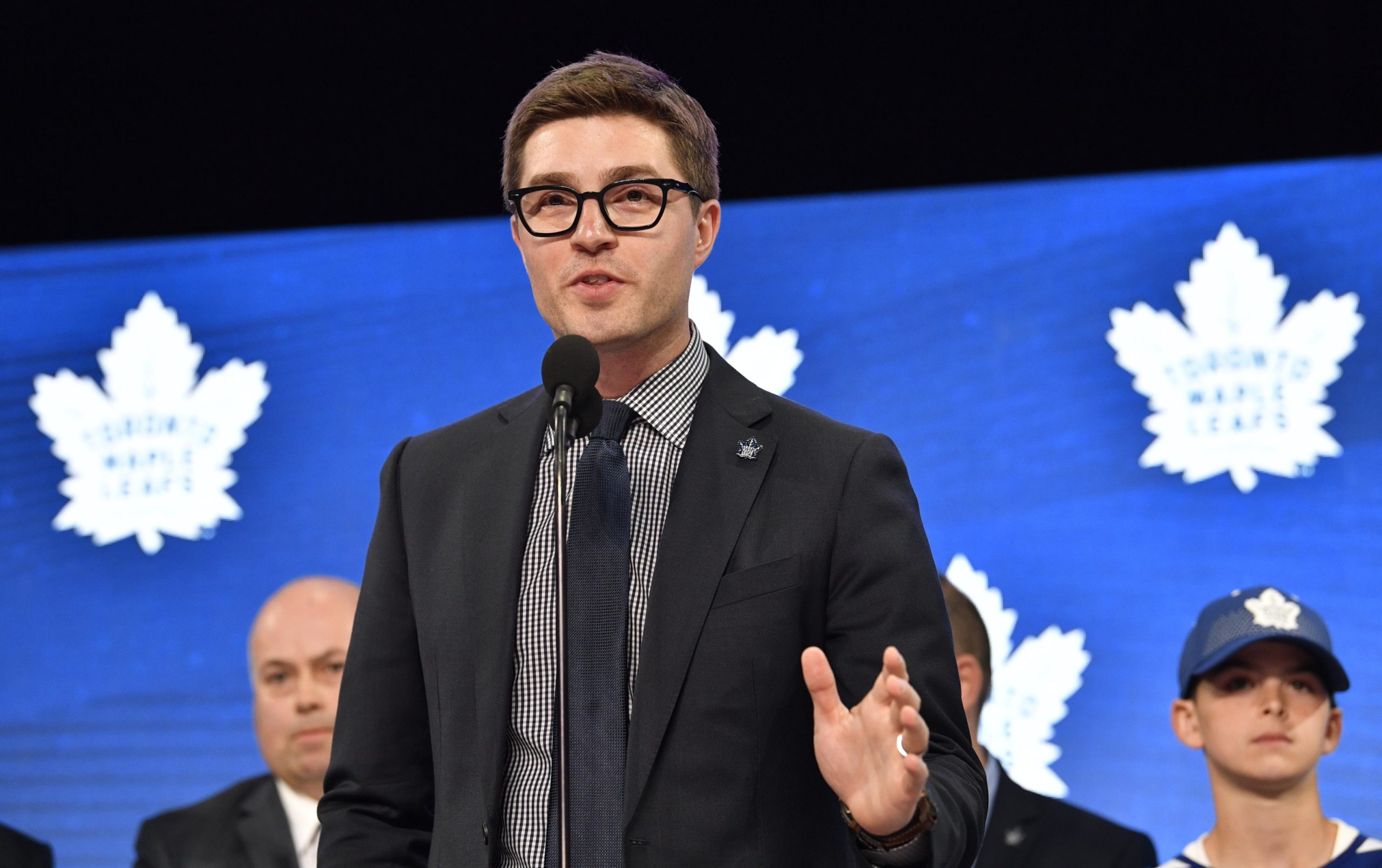
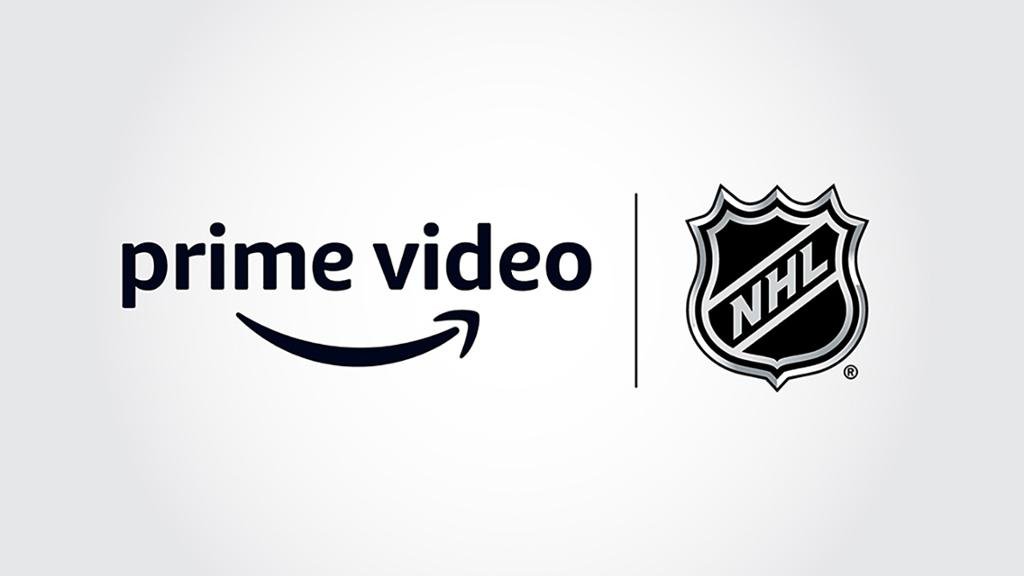
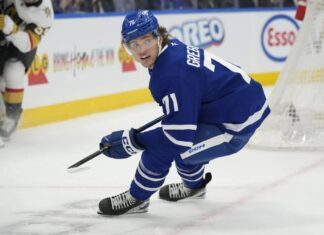




![Craig Berube on Nick Robertson joining William Nylander’s line: “If he gets to a good area on the ice, [Nylander] can find him… He has to put a couple in and get some confidence” Craig Berube, Toronto Maple Leafs head coach](https://mapleleafshotstove.com/wp-content/uploads/2024/10/berube-leafs-prac-100x70.jpg)



